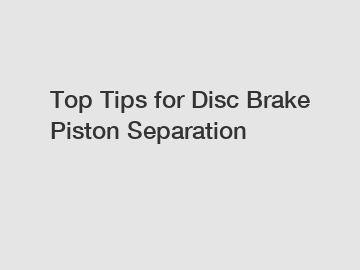Top Tips for Disc Brake Piston Separation
Disc brakes are a crucial component of any vehicle, responsible for stopping the car when needed. The disc brake system consists of calipers, brake pads, and pistons that work together to apply pressure to the brake rotor and slow down the car. Over time, the pistons within the calipers can become stuck or seized, preventing them from properly retracting and causing the brake pads to wear unevenly. This can lead to poor braking performance and even safety hazards on the road. In this blog, we will discuss some top tips for disc brake piston separation to ensure your brakes are in top working condition.
1. Check for Rust and Corrosion.
One of the most common reasons for stuck brake pistons is rust and corrosion buildup. Over time, moisture can seep into the calipers and cause the pistons to seize. To prevent this, it's important to regularly inspect your brake calipers for any signs of rust or corrosion. If you notice any, be sure to clean the affected area thoroughly using a brake cleaner and a wire brush. This will help to remove any debris or corrosion that may be causing the piston to stick.

2. Use a C-Clamp or Piston Tool.
If you find that your brake pistons are stuck and not retracting properly, you may need to use a C-clamp or piston tool to separate them. Start by removing the caliper from the brake rotor and then place the C-clamp or piston tool over the piston. Gently tighten the clamp or tool to apply pressure to the piston and force it back into the caliper. Be sure to do this slowly and carefully to avoid damaging the piston or caliper.
3. Bleed the Brake System.
Another common cause of stuck brake pistons is air bubbles in the brake lines. Air can get trapped in the system during brake pad replacement or other maintenance procedures, causing the pistons to stick. To remedy this, you may need to bleed the brake system to remove any air bubbles. This involves opening the bleeder valve on the caliper and allowing brake fluid to flow through the system until all air bubbles are removed. This will help to ensure that the brake pistons can move freely and retract properly.
4. Lubricate the Caliper Slides.
Keeping the caliper slides well lubricated is essential for proper brake piston separation. Over time, the caliper slides can become dry and dirty, preventing the pistons from moving freely. To prevent this, be sure to regularly lubricate the caliper slides with a high-temperature brake grease. This will help to reduce friction and allow the pistons to retract smoothly when the brakes are released.
5. Inspect the Brake Pads.
Worn or damaged brake pads can also contribute to stuck brake pistons. If the brake pads are unevenly worn or have become glazed, they may not apply even pressure to the pistons, causing them to stick. Be sure to regularly inspect your brake pads for signs of wear and replace them as needed. This will help to ensure that the brake pistons can move freely and the brakes can operate efficiently.
6. Seek Professional Help.
If you're having trouble separating your brake pistons or if you're unsure of how to properly maintain your disc brakes, it's always best to seek professional help. A qualified mechanic will have the knowledge and expertise to properly diagnose and repair any issues with your brake system. They can also provide recommendations for preventative maintenance to keep your brakes in top working condition.
In conclusion, proper disc brake piston separation is essential for ensuring your vehicle's braking system operates efficiently and safely. By following these top tips for disc brake piston separation, you can help prevent stuck pistons and maintain optimal brake performance. Remember to regularly inspect your brake system, lubricate the caliper slides, bleed the brake system, and seek professional help when needed. Taking care of your disc brakes will not only prolong their lifespan but also keep you safe on the road.
For more magnetic tools supplier, led work lamp factory, piston ring pliers manufacturerinformation, please contact us. We will provide professional answers.

Comments